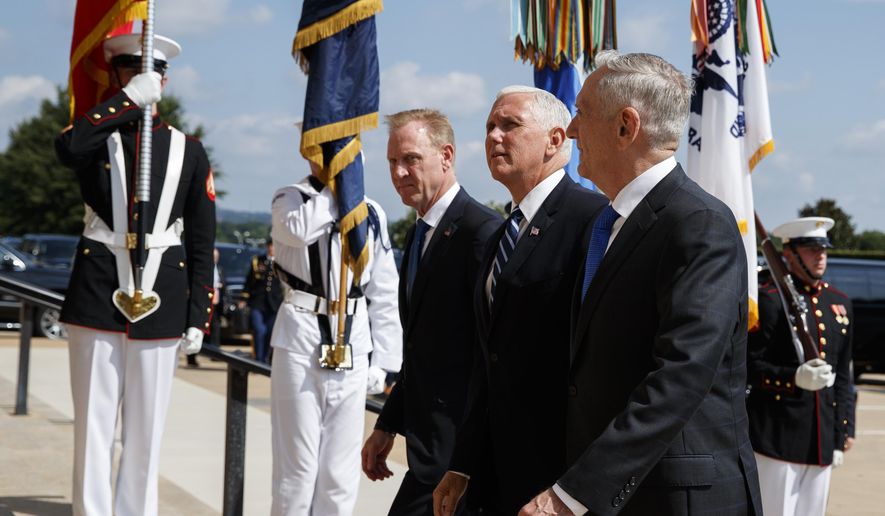President Trump’s Space Force faces a much tougher launch after last week’s midterm elections — and experts say it’ll be up to top generals and Defense Department officials to face down skeptical Democrats on Capitol Hill and persuade them to get on board.
Many leading Democrats now coming to power in Congress — led by California Rep. Adam Smith, widely expected to chair the House Armed Services Committee — are adamantly opposed to the Space Force, which would represent the most significant military overhaul since the creation of the Air Force in 1947.
Mr. Trump, Vice President Mike Pence and other White House officials have been leading the charge, arguing that the U.S. cannot fall behind rivals such as China in preparing for space warfare.
Congressional Democrats, however, are likely to ignore political officials inside the White House, and there’s little Mr. Trump can say to change their minds. Instead, the burden now will fall to military leaders, some of whom have been privately critical of the idea but now are crucial to its prospects.
“This is going to be much harder. I think it’s definitely going to take not just political folks telling Adam Smith this is the right thing to do. It’s going to require uniformed military members to say that as well, and I hope they will,” said Douglas L. Loverro, former deputy assistant secretary of defense for space policy and a supporter of the Space Force concept.
“The correctness of the Space Force did not change [with the midterm elections] on Tuesday,” he said. “It’s still the right thing to do The military members of the DOD and those who do things in space should clearly give their best military advice to the Congress. That’s what they get paid for. My hope is they will make the case. My fear is that just doesn’t come naturally.”
Some military insiders believe there’s been a quiet effort at the Defense Department to kill the Space Force idea, even though Pentagon officials have backed the initiative publicly. Air Force officials, for example, crafted a budget blueprint in September that claimed the Space Force — which would assume responsibility for all military activities in space — would cost $13 billion over its first five years.
Supporters said that number is wildly high, and that the eye-popping figure was floated to undermine the concept.
To some degree, the plan worked. Democrats such as Mr. Smith have cited the cost as a key reason the initiative shouldn’t go forward.
“I am opposed to President Trump’s proposal for a Space Force,” Mr. Smith said in a statement after last week’s midterms. “I am concerned that his proposal would create additional costly military bureaucracy at a time when we have limited resources for defense and critical domestic priorities, and I do not believe it is the best way to advance U.S. national security.”
Indeed, the Defense Department is expected to face its first budget cut of the Trump era, creating a serious public relations hurdle for the Space Force. The White House’s fiscal year 2020 budget reportedly will fund the Pentagon at $700 billion — a 2.2 percent cut from this year’s $716 billion.
It’ll be difficult for political leadership in the White House and military officials across the Potomac to argue in favor of an expensive military restructuring at a time of budget cutbacks.
“The stand up of a new space armed force as a separate service is going to cost billions at a time the administration is cutting defense. This makes no sense from a capability or a fiscal perspective,” said retired Air Force Lt. Gen. David Deptula, now the dean of the Mitchell Institute for Aerospace Studies.
“When the House and Senate start to have serious hearings on the reality of the implications of standing up a new space armed service I think what you’ll see is both the House and Senate will have the wisdom to see now is not the time to stand up another bureaucracy,” he added.
Mr. Deptula and others argue that the proper move is to create a Unified Space Command, similar in structure and authority to existing military arms such as U.S. Cyber Command. The Pentagon already is creating such a command as a bridge to the Space Force, which would become the sixth branch of the armed forces and enjoy equal stature with the Army, Navy, Marine Corps, Air Force and Coast Guard, which is under the Department of Homeland Security.
Defense Secretary James Mattis previously had expressed opposition to an all-out Space Force equal to the other branches, though he’s now fully on board with the idea and has said the Pentagon will carry out the president’s direction.
It’ll now be up to him and his deputies, specialists say, to persuade Congress. Space Force supporters say the case he’ll make at budget hearings early next year is simple.
“The case I make is very simple: We need an organization that understands, into their bones, that space is their thing and they are singularly responsible for protecting this domain and exercising this domain for the United States of America,” Mr. Loverro said.
• Ben Wolfgang can be reached at bwolfgang@washingtontimes.com.




Please read our comment policy before commenting.